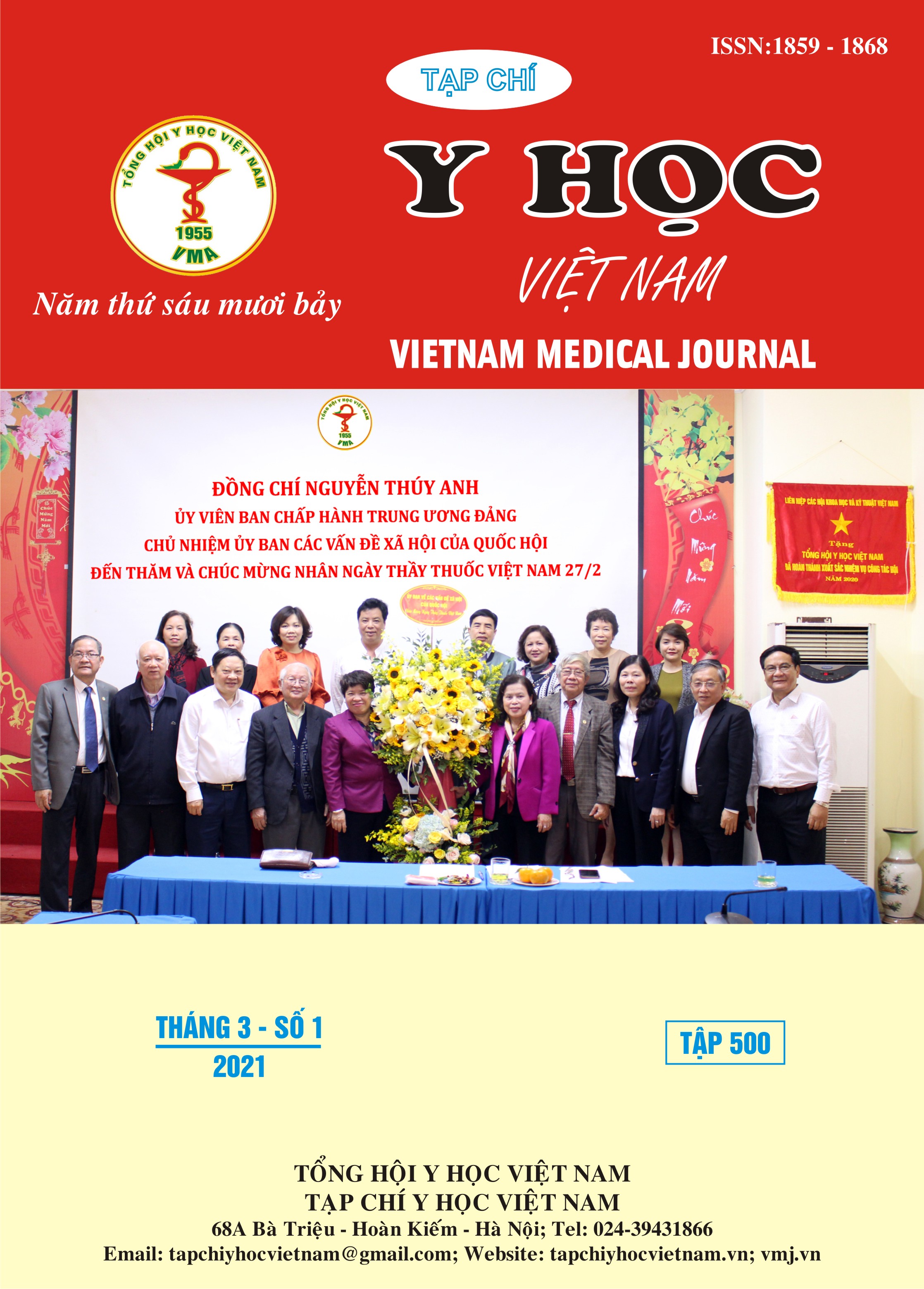TÌNH TRẠNG DINH DƯỠNG TRƯỚC PHẪU THUẬT Ở BỆNH NHÂN UNG THƯ ĐẠI TRỰC TRÀNG TẠI BỆNH VIỆN ĐẠI HỌC Y DƯỢC THÀNH PHỐ HỒ CHÍ MINH
Nội dung chính của bài viết
Tóm tắt
Đặt vấn đề: Ung thư đại trực tràng (UTĐTT) là một trong những loại ung thư (UT) phổ biến nhất trên thế giới. Theo GLOCOBAN 2018 UTĐTT xếp thứ 3 về tỉ lệ mắc (10,2% với 1.849.518 ca) và xếp thứ 2 về tỉ lệ tử vong (9,2% với 880.792 ca). UT đường tiêu hoá đã được chứng minh có tỉ lệ SDD cao hơn so với các vị trí khác chiếm 20 -85%, trong đó 28 – 52,4% bệnh nhân UTĐTT được chẩn đoán SDD. SDD trước và sau mổ có thể tác động đến quyết định phương pháp điều trị, ảnh hưởng đến hệ miễn dịch của cơ thể gây tăng nguy cơ biến chứng sau mổ như nhiễm trùng hoặc xì rò vết mổ (5–52%), giảm đáp ứng và tăng chi phí điều trị (hơn 25%), kéo dài thời gian nằm viện (8 - 60 ngày) tăng gấp đôi nếu có SDD nặng chu phẫu, tăng tỉ lệ tử vong, từ đó làm suy giảm chất lượng cuộc sống, đáp ứng điều trị và tiên lượng bệnh. Mục tiêu: Xác định tỉ lệ suy dinh dưỡng trước phẫu thuật của bệnh nhân ung thư đại trực tràng tại bệnh viện Đại học Y Dược Thành phố Hồ Chí Minh. Đối tượng và phương pháp nghiên cứu: Nghiên cứu cắt ngang mô tả được tiến hành trên 130 bệnh nhân ung thư đại trực tràng tại bệnh viện Đại học Y Dược Thành phố Hồ Chí Minh từ 10/2020 - 02/2021. Thông tin được thu thập bằng bộ câu hỏi soạn sẵn, qua phỏng vấn và khám trực tiếp mặt đối mặt và tra cứu hồ sơ bệnh án. Kết quả: Tỉ lệ suy dinh dưỡng trước phẫu thuật theo PG-SGA: 52,3%, trong đó SDD mức độ nặng chiếm 16,9%, tình trạng theo BMI và albumin lần lượt là: 13,1%, 38,5%. Có sự khác biệt có ý nghĩa thống kê giữa cân nặng trước nhập viện 6 tháng và cân nặng khi nhập viện (p < 0,001). Kết luận: Đánh giá dinh dưỡng toàn diện cho bệnh nhân ung thư đại trực tràng trước khi phẫu thuật nên được thực hiện để can thiệp dinh dưỡng kịp thời, thích hợp và tăng đáp ứng và hiệu quả điều trị.
Chi tiết bài viết
Từ khóa
suy dinh dưỡng, ung thư đại trực tràng, PG-SGA
Tài liệu tham khảo
2. Nguyễn Hà Thanh Uyên, Đoàn Duy Tân, và Phạm Thị Lan Anh (2018). Tỉ lệ suy dinh dưỡng trước mổ bệnh nhân ung thư đại trực tràng và các yếu tố liên quan tại bệnh viện Bình Dân Thành phố Hồ Chí Minh năm 2017. Y học thành phố Hồ Chí Minh, 22(1), 122–129.
3. Maurício S.F., Xiao J., Prado C.M. và cộng sự. (2018). Different nutritional assessment tools as predictors of postoperative complications in patients undergoing colorectal cancer resection. Clin Nutr Edinb Scotl, 37(5), 1505–1511.
4. Arends J., Bachmann P., Baracos V. và cộng sự. (2017). ESPEN guidelines on nutrition in cancer patients. Clin Nutr, 36(1), 11–48.
5. Caballero C.I.A., Lapitan M.C.M., và Buckley B.S. (2012). Nutritional assessment of adult cancer patients admitted at the Philippine general hospital using the scored patient-generated subjective global assessment tool (PG-SGA). Clin Nutr Suppl, 7(1), 186–187.
6. Hu W.-H., Cajas-Monson L.C., Eisenstein S. và cộng sự. (2015). Preoperative malnutrition assessments as predictors of postoperative mortality and morbidity in colorectal cancer: an analysis of ACS-NSQIP. Nutr J, 14.
7. Santos A.F. dos, Rabelo Junior A.A., Campos F.L.B. và cộng sự. (2017). Scored patient-generated Subjective Global As sessment: Length of hospital stay and mortality in cancer patients. Rev Nutr, 30(5), 545–553.
8. Ottery, F. D, McCallum, P. D, và Polisena, C. G (2000). Patient generated subjective global assessment. 11–23.


